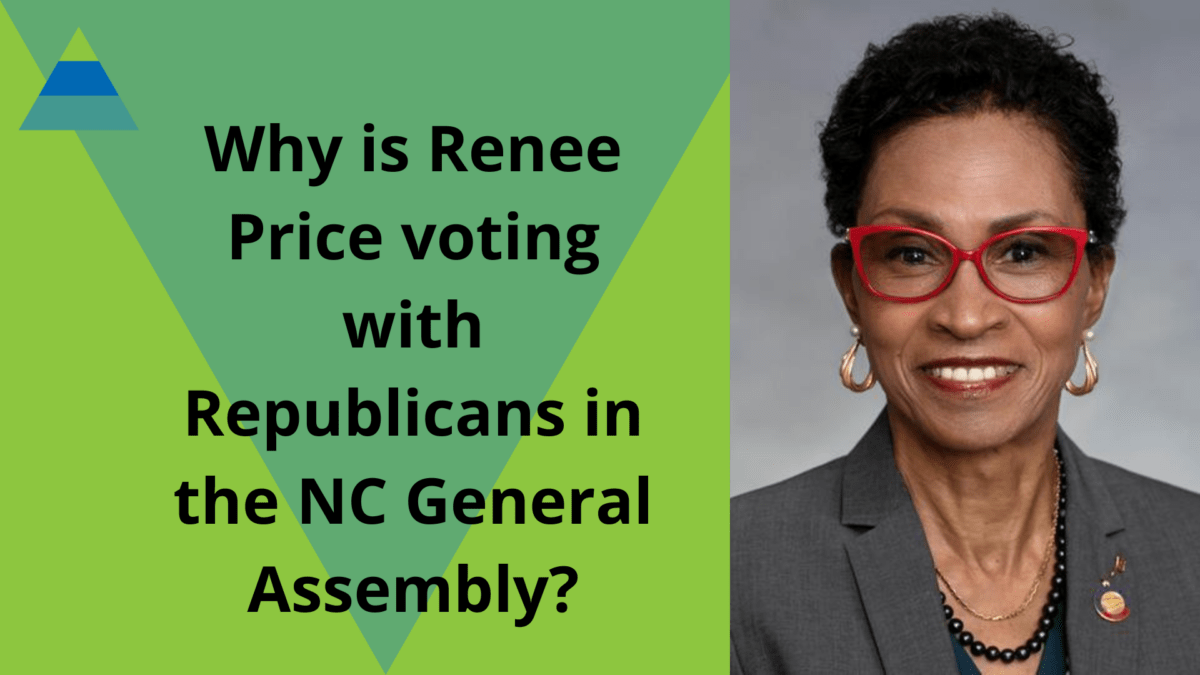Last month, IndyWeek reported that six local Democrats in the state House supported a new bill, HB 551, that would ban municipalities from adopting rules preventing tenant discrimination, making it more difficult for low-income residents of North Carolina to find places to live. Tenants groups across the state have opposed the bill.
Among the Dems supporting this terrible bill was Rep. Renée A. Price. Price served on the Orange County Board of Commissioners for a decade before running for the NCGA, where she represents parts of Orange and Caswell Counties.
Rep. Price told IndyWeek that “Builders don’t want these types of controls… And with smaller landlords, some of them are not really into being forced to accept these vouchers.”
It is disappointing that Rep. Price appears to take the interests of landlords, many of whom take advantage of low-income tenants, over low-income renters with an average median income, IndyWeek reports, of $13,450 per year.
Other parts of the bill make it easier for landlords to evict tenants, and raise the stakes by making it easier for landlords to force tenants to pay their attorneys’ fees if they do prevail.
The Town of Chapel Hill recently approved a Source of Income Protections policy, which requires housing developments that receive Town funding or involve the conveyance of Town property to accept all lawful sources of income, including housing choice vouchers. (Fortunately, HB 551 does not impact source of income protections for affordable housing projects that local governments help fund.)
We reached out to Rep. Price for comment. Her response emphasized the burdens on smaller landlords to comply with the Section 8 regulations. She also noted that “we have seen in NC and elsewhere that property owners can use other criteria for accepting renters, or work around the system by raising rates above the cost of the voucher.”
Is that a reason to act to make the system even harder for renters? It’s hard to understand how this is going to help her lower-income constituents.
Plus, regarding the burdens on small landowners, Virginia figured it out. Its Fair Housing Law, which the legislature updated in 2020, includes protections for source of income and exempts landlords who own fewer than four rental units. It’s unfortunate that Rep. Price didn’t think that local governments could be trusted to take into account these concerns, and that it was good for state Republicans to block local communities from enacting any source of income protections.
Price also recently initially voted with Republicans when HB130 first came before the House. That bill prohibits local governments from reducing their environmental footprint by restricting gas and propane in commercial and residential buildings. (In other words, it prevents municipalities from telling developers they must use electric appliances.) This makes it harder to enact clean energy policies, and was heavily lobbied for by the gas and propane industry. Lisa Sorg, a reporter for NC Newsline, reported on the intense lobbying effort, which dismissed environmental and health concerns about gas stoves.
In initially voting for HB130, Price ignored the North Carolina Sierra Club, which called the bill “bad” and sent out an alert to members about the bill’s environmental repercussions. Price was previously endorsed by both the NC League of Conservation Voters and the North Carolina Sierra Club, as well as the Progressive Democrats of Orange County.
In the end, even though she voted for the bill when it initially came before the House, she voted against the final version. In her response to Triangle Blog Blog, she did not explain why she flipped her vote; no changes in the bill jump out at us. Her response focused on the cost burdens of energy efficiency on individuals and families. That’s a perfectly valid point.
While capital investments in energy efficiency like heat pumps and insulation do save energy, they’re expensive to retrofit on old homes. But what she elides is that such restrictions in other communities do not prohibit existing homes from hooking up to fossil fuel sources. Instead, they require that new homes use electric appliances. The impact on current residents would be negligible.
She adds: “I believe that financial assistance or other measures should be in place in order for lower and moderate income households to be included in the effort to protect human life and the environment.” The good news is these programs exist. There’s a program in Orange County which is doing just that, and providing grants to help lower income households improve the efficiency of their homes. Carrboro’s WISE program is a grant-funded weatherization program. Likewise, the state has a Weatherization Assistance Program aimed at low-income households.
These programs surely need more funding. But to use that as a reason to initially vote for a bill that restricts communities from taking decisive action on climate change (and also, incidentally, that makes it harder to build large utility-scale solar facilities), even if she later flipped to the other side, is a disappointment.
On her website, Price listed affordable housing and climate as among her priorities, but these votes do the exact opposite. We are deeply disappointed in Price, and call on her to prioritize the issues that Orange and Caswell County voters elected her to represent.
Geoff Green contributed to this post.

